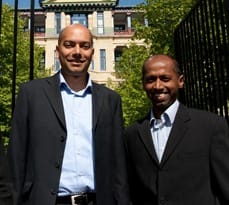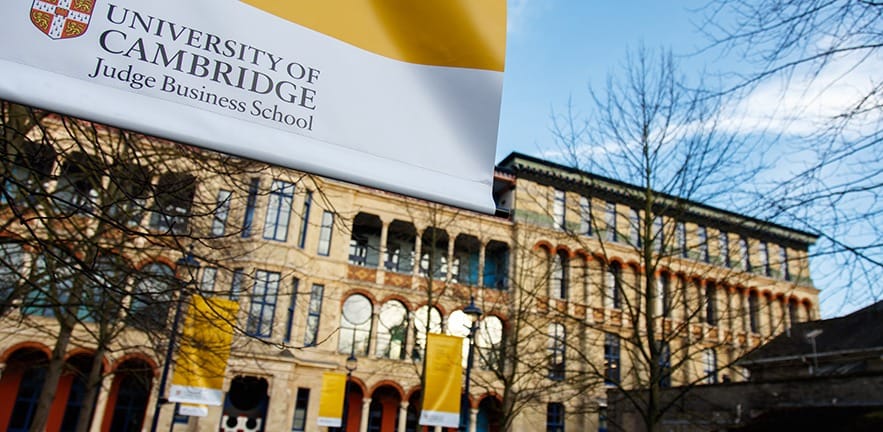A regular update on articles, awards and other developments involving Cambridge Judge Business School faculty and fellows.
‘Frugal Innovation’ by Jaideep Prabhu and Navi Radjou of Cambridge Judge scoops Chartered Management Institute Book of the Year award

Frugal Innovation, a book authored by two Cambridge Judge academics about how inexpensive can also be efficient, won the top award at the annual Chartered Management Institute (CMI) Book of the Year contest. Frugal Innovation beat 170 entries and scooped the £5,000 top prize at an 8 February award ceremony at the British Library in London.
The book, co-authored by Jaideep Prabhu, Jawaharlal Nehru Professor of Indian Business & Enterprise at Cambridge Judge Business School, and Navi Radjou, Fellow in India & Global Business at Cambridge Judge, explains how Western countries can do more with less by embracing frugal principles and techniques widely adopted by developing countries like India.
Frugal Innovation was published in February last year, with a foreword written by Unilever CEO Paul Polman. Jaideep and Navi argue that a frugal revolution is sweeping the West, thanks to major trends such as the sharing economy, the circular economy and the maker movement.
Ann Francke, chief executive of CMI, which runs the competition, said:
“Frugal Innovation sets out for organisations big and small the blueprint for being more agile to deal with the demands of the digital age. Doing more with less is a mantra that applies equally to how companies must innovate and to redefining values for sustainable living. These are essential lessons for 21st century managers and leaders.”
The CMI Management Book of the Year Awards were launched in 2010, run in association with The British Library and sponsored by Henley Business School. The winning books are chosen by a panel of leading business and management figures and are “those easily accessible reads that offer practical lessons for managers that can be applied on an everyday basis.”
The European Business Review creates a new section called ‘David de Cremer on Management’ to showcase his articles – including a new one on Huawei

The European Business Review has launched a new section on its website called “David de Cremer on Management” to showcase the articles of David De Cremer, KPMG Professor of Management Studies at Cambridge Judge.
The section, which appears on the blogs area of the publication’s website, brings together numerous articles David has written for European Business Review. This includes a newly published one on the marketing strategy of Chinese telecoms company Huawei entitled “Why Focus Matters to Your Leadership: Understanding Huawei’s Business Strategy”.
The article says that Huawei’s new marketing push launched this year “aims to present their business philosophy to a broader audience including decision and policy makers. In fact, the importance of setting priorities can clearly be identified as one of the main drivers of their philosophy.”
Visit the new “David de Cremer on Management” section on the European Business Review website
Read David De Cremer’s new article on Huawei on the European Business Review website
Sucheta Nadkarni of Cambridge Judge speaks at several high profile events of interest to women in business

Professor Sucheta Nadkarni of Cambridge Judge Business School, who authored a pioneering study, ‘The rise of women in society: enablers and inhibitors. A global study’, last year on women in corporate boardrooms and is instrumental in the School’s Women’s Leadership Initiative, is speaking early this year at several high-profile events of interest to women and the broader business community.
Sucheta, Sinyi Professor of Chinese Management at Cambridge Judge, delivered the keynote address on 3 February to an event at the JP Morgan Centre in London organised by Level 20, a not-for-profit organisation formed by senior women in the private equity sector – which aims by 2020 to raise to 20 per cent the representation of women at senior levels in the European private equity industry.
The Marshall Society, which is the Economics Society of the University of Cambridge, will feature Sucheta as speaker 9 February at the launch event of a new women in economics speaker series. The Society dates to 1927, and former members include famous economist John Maynard Keynes.
Sucheta also will be part of a panel in Paris on 18 March at the Women Changing Women conference organised by Barnard College at Columbia University, which is Barnard’s eighth annual global symposium. The event will discuss “current events and rapidly changing policies that are influencing women’s roles across Europe, both in and out of the workplace” – including the issue of women in the boardroom, which Sucheta analysed in her study “The rise of women in society: enablers and inhibitors, a global study”.
Visit Level 20’s website
Visit the Marshall Society website
Find out more about the 2016 global symposium at Barnard College, Columbia University
Article on the circular economy co-authored by Khaled Soufani appears in the Harvard Business Review

An article co-authored by Khaled Soufani, Senior Faculty in Management Practice and Director of the Executive MBA Programme at Cambridge Judge, on how the “circular economy” can help create a more sustainable environment appeared in the Harvard Business Review.
The article notes how the recent Paris Climate Summit, in addition to discussing a reduction in emissions targets, also focussed on the need for a circular economy.
“Employing a circular supply chain would help make processes, such as product design, procurement, and waste management, more efficient and productive,” says the article. “We see three ways businesses can start: 1) recycle more and better, 2) rent goods, and 3) lengthen the longevity of products.”
Read the article on Harvard Business Review
Survey of 18,000 UK academics finds that academics are helping the UK economy to grow by engaging with business, as well as the public and third sectors.
A new survey of more than 18,000 academics in the UK found that the majority of academic researchers are committed to helping the British economy grow by engaging with business and other parts of the economy.
The report, The Changing State of Knowledge Exchange, was produced by researchers from Cambridge Judge Business School, the Centre for Business Research, Imperial College London and the University of Bath.
The research shows the wide spectrum of mechanisms through which academics engage with external partners – these not only include means of commercialisation (such as patents and licenses) but a diverse variety of people-based and problem-solving mechanisms. It also shows the wide extent of interactions across disciplines – although the highest level of engagement was by academics from engineering, there was also significant engagement by academics from other disciplines including the social sciences and the arts and humanities.
The survey also found that engagement with external partners strengthened both academic research and teaching: more than half the academics said that working with outside partners influenced the way they shaped their teaching, while nearly a third said that it increased the employability of their students.
The results show that funding and time constraints can hinder partnerships with external organisations from the private, public and third sectors.
This study was undertaken at the Centre for Business Research and was commissioned through the National Centre for Universities and Business (NCUB), and funded by the Arts and Humanities Research Council, the Department for Business, Innovation & Skills, the Economic and Social Research Council, the Engineering and Physical Sciences Research Council, the Higher Education Funding Council for England, the Medical Research Council, and the Natural Environment Research Council.
Download the full report on the National Centre for Universities & Business website


